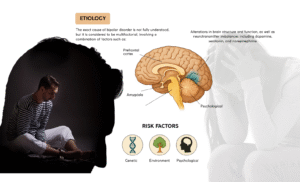Bipolar disorder is a complex mental health condition that influences a person’s emotions, thoughts, and daily routines. It involves intense mood changes that can make everyday life feel overwhelming—but with the right support, stability is possible.
At SDH, we believe in creating environments where mental health is treated with care, dignity, and genuine support. We work collaboratively with participants’ allied health professionals to ensure support is coordinated, tailored, and aligned with each individual’s goals.
What is Bipolar Disorder?
Bipolar disorder is known for emotional highs (mania or hypomania) and deep emotional lows (depression). These changes aren’t just everyday ups and downs—they are stronger, longer-lasting shifts that impact sleep, focus, energy, and relationships.
What Factors Contribute to It?
There’s no single cause, but a number of influences may lead to bipolar disorder, including:
- Brain function: Changes in chemical messengers in the brain
- Family history: It can run in families
- Life challenges: Stressful or traumatic events may play a role
- Existing emotional struggles: Conditions like anxiety or substance use can increase risk
🧩 What Are the Signs?
People with bipolar disorder experience two types of episodes—high-energy states and low-energy states.
🌟 During High-Energy Phases (Mania/Hypomania), a person may:
- Talk very fast or become overly excited
- Shift topics quickly without finishing thoughts
- Feel full of energy with little need for rest
- Take risks or make sudden decisions
🌧️ During Low-Energy Phases (Depression), a person may:
- Feel emotionally low or disconnected
- Find no interest in things they used to enjoy
- Sleep too much or too little
- Have trouble focusing or managing tasks
These patterns look different from person to person. Being aware of them helps with early support.
🧪 Getting the Right Help
Identifying bipolar disorder takes time, conversations, and careful observation from a qualified mental health expert. It often involves reviewing emotional patterns over time and understanding how those changes affect a person’s well-being.
❤️ Why Care and Support Make a Difference
Living with bipolar disorder can feel isolating, but with the right kind of help—such as trusted health professionals, consistent routines, and emotional guidance—many people regain balance and lead fulfilling lives.
It’s not just about treatment; it’s about feeling understood, supported, and not judged.
🌱 There Is a Way Forward
Bipolar disorder is manageable. With the right approach and ongoing support, individuals can maintain emotional wellness and enjoy everyday life. You’re not alone—and help is within reach.
Let’s Connect
Looking for support or safe, inclusive housing?
📧 info@sdhwa.com.au
📞 (08) 9468 5550
🌐 www.sdhwa.com.au
Together, we can make mental health support accessible, respectful, and life-changing.








